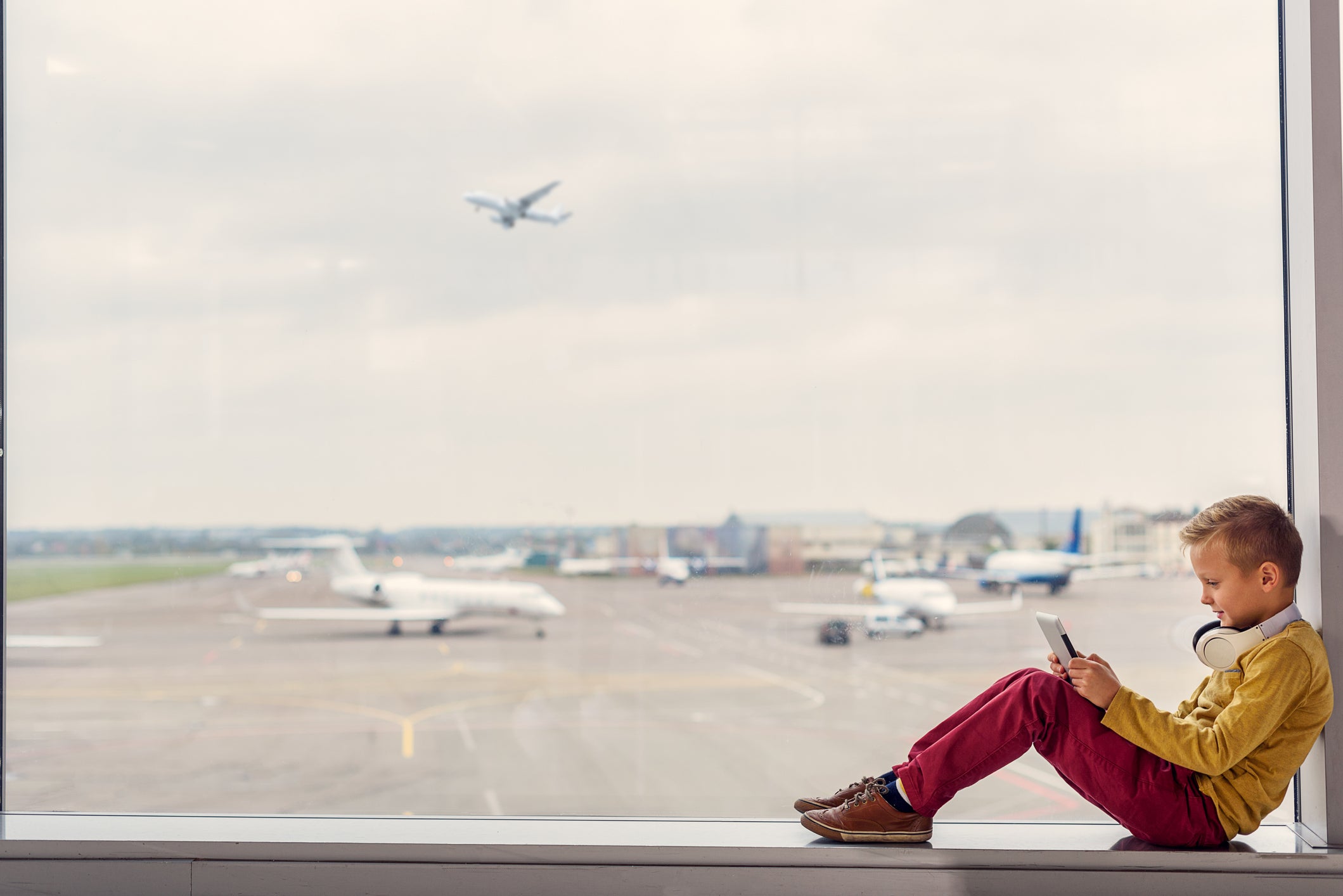
CAN KIDS FLY ALONE? EVERYTHING YOU NEED TO KNOW ABOUT UNACCOMPANIED MINOR FLIGHTS
Sitting alone at the gate watching your child's plane push back from the jet bridge without you is an interesting moment, to say the least. In that breath, you're probably equal parts proud, excited and nervous for your child to fly alone.
Each airline has specific policies and fees regarding unaccompanied minor flights, but here we're talking about the important stuff: actual tips to help your unaccompanied minor fly.
Arranging for your child to travel solo for the first time is a big deal and a huge moment in creating the next generation of travelers. Once you and your child are ready, here's how to prepare them to fly as an unaccompanied minor.
Can minors fly alone?
Some airlines, like Delta Air Lines and Alaska Airlines, will accept unaccompanied minors but will only allow them on select nonstop or direct flights until they reach a certain age. Others, like Allegiant Air, do not accept unaccompanied minors at all and will only allow passengers 15 years or older (which they consider to be adults) to fly.
Typically, a parent or guardian will need to complete paperwork and obtain boarding passes at the check-in desk, get a gate pass, escort the child through security and then wait at the child's gate until their plane is in the air. Upon arrival, a designated adult can go through the same process and wait at the gate when the child's plane arrives.
How old do you have to be to fly alone?
Most U.S. airlines will transport your child without a parent or guardian — at least on select flights — once they turn 5 years old if you pay the unaccompanied minor fee.
Related: Child turning 18? Here's everything you need to know before the next time they travel
The fee covers additional supervision by the airline, assistance getting on and off the plane, an escort to any connections and assistance in the event of irregular operations.
On most airlines, kids between 15 and 17 can choose to travel as adults or unaccompanied minors. If they have valid identification, they do have the option to travel as adults, but they may have to pay the unaccompanied minor fee and opt for additional assistance.
Tips for booking an unaccompanied minor flight
Make sure your child is mentally and emotionally prepared to travel alone
One child may be ready to fly to grandparents' house solo at age 6, while another won't be ready to fly alone even at age 16. While most of your imagined nightmare scenarios aren't likely to happen, you need to think through situations such as diversions, delays or safety concerns.
Will your child be able to handle those types of situations without you? If the answer is absolutely not, then perhaps this isn't the year for them to fly solo.
Keep the itinerary simple
You should book nonstop flights whenever possible to make your child's travel experience simple and smooth. Until they reach a certain age, most airlines will require you to book a nonstop or direct flight for your child.
If your child is old enough to book a connecting flight, think long and hard about every connection. Each layover exponentially increases the chance of something going wrong and your child spending significant time away from a caregiver. They could be potentially stranded in a place you can't easily get to.
Buy flights that depart earlier in the day. This helps avoid potential delays, diversions or rebookings that could require an overnight stay if they happen later in the afternoon or evening.
Choose their seat wisely
Pick a seat nearest the cabin crew. Typically, this will put them pretty close to the front of the plane. However, some airlines actually ask that you seat your children in the very last row; in some cases, the airline will assign their seats automatically. Either way, try and have them close to where the crew sits.
Provide your child with a way to contact you
Give your child a phone or make sure they have some other way to reach you in case of emergency. This could be an iPad or Apple Watch, so they can FaceTime or message you on Wi-Fi if they're not on a cellphone plan yet. As an added bonus, you can track your child with whatever device you choose. Perhaps most importantly, ensure they have a charger on them to keep their device powered.
You'll also want to give a printed list of emergency contacts to your child. It's a good idea to teach them to ask an airline employee for help in the event that they can't contact you or a designated guardian directly. As for yourself, remember to stay available and close to your phone the entire time your child is in transit.
Send cash, cards and comfort
Make sure your child has some way to pay for food and incidental expenses. Do not count on the airline (or their contracted provider) to be your child's babysitter and provide for every potential need. Remind your child to eat something before the flight or encourage them to grab a snack and drink to bring on the plane. Alternatively, you can pack snacks in their carry-on. Having a small comfort from home, like a pillow or blanket, can make for a smoother flight, as well.
Remember airline employees aren't babysitters
While you are paying a fee for the airline to ensure your child gets from Point A to Point B, the $50 to $150 you paid does not supply a constant babysitter for your child. Hopefully, the flight attendant (or other airline employee) will watch your child and check in periodically to see if they need anything.
However, they aren't there to provide constant supervision by any stretch of the imagination. If your child needs constant supervision, they are not ready to fly alone.
Get to the airport very early
It takes extra time and additional paperwork to have your child fly as an unaccompanied minor, and you can't complete much of this until you're in person on the day of departure. You will need to interact with an airline employee at the check-in counter. So, factor in the time needed for that process as well as potential lines, traffic and time necessary to get through security.
Track the flight
You'll need to stay at the departure gate until the flight is in the air, but there are ways to keep tabs on the plane once it has left the airport.
Set flight tracking alerts from both the airline's website and perhaps from an app like Flighty or FlightAware as well. While the flight is en route, you can periodically check the plane's location to ensure things are progressing as planned.
Tips for kids flying as an unaccompanied minor
Here are things TPG director of content Summer Hull told her child before she flew as an unaccompanied minor.
Listen and ask questions
Summer explained that, just like in school, her child won't have a parent there to do things for her; Summer told her child she must pay attention to instructions and ask questions if she is unsure of anything. Comparing a flight attendant to a teacher (in terms of being the point person who is in charge and available to help) was an easy-to-understand comparison. Reminding her to keep her earbuds in and actually listen to announcements was a crucial part of our preflight chat as well.
Speak up — loudly — if something is wrong
You can preface this part of the chat and say it's very unlikely that something will go wrong. However, it's still important to know what to do should the worst happen.
Summer also told her child what to do if someone puts her in an uncomfortable situation. Summer explained that while some people naturally react to negative scenarios by freezing and staying quiet, it's important to speak up loudly — multiple times if necessary — to get out of a potentially bad situation. Then, she told her child to seek out a flight attendant or another adult for assistance.
It's important that children know issues could arise with other passengers or even an airline employee. However, it's also important that they know many adults around them can help if something goes wrong or if things just don't feel right.
Don't leave the gate
If everything goes to plan, one adult will be at the departure gate until the plane is safely in the air, and another will be waiting at the arrival gate before the plane lands. Still, there are plenty of things that could happen, and the child could end up at a gate without a guardian there to welcome them. In that case, a child needs to know not to leave the gate, even if no airline employee is keeping a close eye on them.
Bottom line
You might be riddled with anxiety knowing your kid is flying without an adult, but sometimes there is no better choice. Eventually, your child may even be the one pushing to travel by themselves.
As a parent, only you know when your child is ready, but there are real lessons and a lot of growth that can come with a child traveling solo. Airline policies for unaccompanied minors explain the limits of what is possible, but deciding what is best within those parameters is up to you. Every child and situation is different.
Related reading:
Editorial disclaimer: Opinions expressed here are the author’s alone, not those of any bank, credit card issuer, airline or hotel chain, and have not been reviewed, approved or otherwise endorsed by any of these entities.
